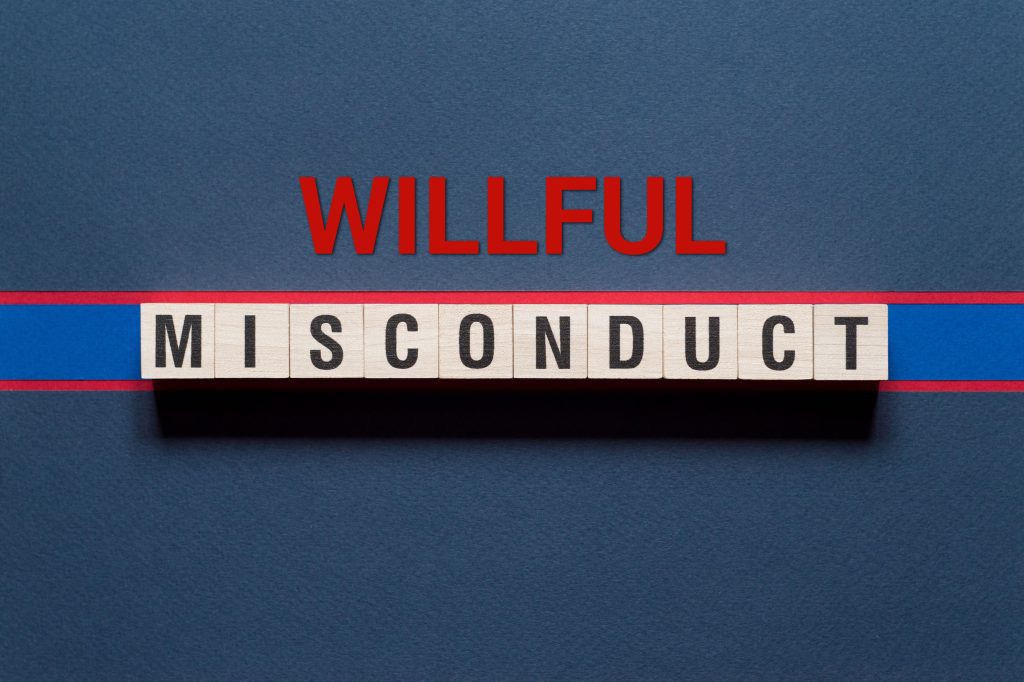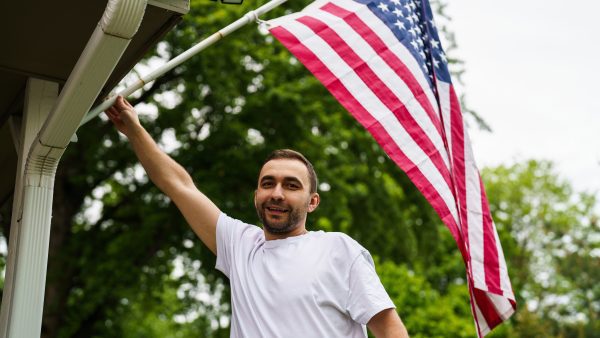What the heck is willful misconduct?
Willful misconduct is an act involving conscious wrongdoing or known prohibited action.
A wrongful act is either inherently wrong or forbidden by law.
Willful misconduct involves deliberate or intentional wrongdoing with knowledge of, or wanton and reckless disregard of, its probable consequences.
According to 38 CFR 3.301(a), the VA may award direct service connection only when a disability or cause of death was incurred or aggravated in the line of duty, and not the result of the veteran’s own willful misconduct.
Okay, let’s dive deeper into “how” willful midconduct and line of duty can impact VA service connection.
- Understanding Willful Misconduct for VA Claims
- What are Some Examples of Willful Misconduct?
- When Does the VA Make a Willful Misconduct Determination?
- Can I Get VA Service Connection for Secondary Conditions as a Result of Alcohol or Drug Abuse?
- Reference: 38 CFR § 3.301 Line of Duty (LOD) and Willful Misconduct
- About the Author
Understanding Willful Misconduct for VA Claims

Willful misconduct from the VA refers to actions or behavior on the part of a veteran that demonstrate an intentional disregard for the safety and well-being of themselves or others.
VA regulations specifically define willful misconduct as “an act involving conscious wrongdoing or known prohibited action.”
In the context of veterans’ benefits, willful misconduct can affect a veteran’s eligibility for certain benefits, particularly disability compensation.
What are Some Examples of Willful Misconduct?
- Alcohol and Drug Abuse: Willful misconduct often comes into play when a veteran’s disability or condition is a direct result of excessive alcohol or drug use. This can include injuries or health conditions arising from alcohol-related accidents, drug overdoses, or other substance abuse-related incidents.
- Criminal Activity: Engaging in criminal activities that result in injuries or harm to oneself or others can be considered willful misconduct. This may include incidents such as fights, altercations, or illegal drug transactions.
- Self-inflicted Injuries: Deliberate acts of self-harm or suicide attempts can also be categorized as willful misconduct.
When Does the VA Make a Willful Misconduct Determination?
The VA will make a willful misconduct determination if a death or disability that affects entitlement occurred under questionable circumstances
Willful misconduct is not determinative unless it is the proximate, or direct, cause of injury, disease, or death.
References: For more information on willful misconduct, see
Can I Get VA Service Connection for Secondary Conditions as a Result of Alcohol or Drug Abuse?
Yes, you can, but it depends on whether the alcohol or drug abuse resulted in the disease or disability versus the alcohol or drug abuse is secondary to a service connected condition.
For example, if alcohol abuse was a coping mechanism for your PTSD, the VA should award service connection for the PTSD and the alcohol abuse is a contributing factor to the severity of your PTSD.
Here’s how the VA Rater will look at it:
- If the disease or disability is a secondary result of alcohol or drug abuse, service connection cannot be awarded (effective November 1, 1990).
- If a veteran’s alcohol or drug abuse is determined to be part of or secondary to a service connected condition, then any disease or disability resulting from the alcohol or drug abuse should still be service connected according to 38 CFR 3.310(a).
Important notes about VA claim dates:
- On or before October 31, 1990, organic diseases and disabilities that are a secondary result of chronic use of alcohol, whether out of compulsion or otherwise, are considered to have been incurred in the LOD, and
- After October 31, 1990, organic diseases or disabilities secondary to chronic use of alcohol are not considered to be incurred in the LOD.
Note: Prior to August 13, 1964, organic diseases and disabilities resulting from the chronic use of alcohol were due to willful misconduct.
Reference: For more information on rating decisions on diseases related to use of alcohol, see M21-1, Part X, Subpart iv, 1.D.
Reference: 38 CFR § 3.301 Line of Duty (LOD) and Willful Misconduct
Line of Duty:
Direct service connection may be granted only when a disability or cause of death was incurred or aggravated in line of duty, and not the result of the veteran’s own willful misconduct or, for claims filed after October 31, 1990, the result of his or her abuse of alcohol or drugs. (Authority: 38 U.S.C. 105)
Willful Misconduct:
Disability pension is not payable for any condition due to the veteran’s own willful misconduct. (Authority: 38 U.S.C. 1521)
Venereal Disease:
The residuals of venereal disease are not to be considered the result of willful misconduct. Consideration of service connection for residuals of venereal disease as having been incurred in service requires that the initial infection must have occurred during active service. Increase in service of manifestations of venereal disease will usually be held due to natural progress unless the facts of record indicate the increase in manifestations was precipitated by trauma or by the conditions of the veteran’s service, in which event service connection may be established by aggravation. Medical principles pertaining to the incubation period and its relation to the course of the disease; i.e., initial or acute manifestation, or period and course of secondary and late residuals manifested, will be considered when time of incurrence of venereal disease prior to or after entry into service is at issue. In the issue of service connection, whether the veteran complied with service regulations and directives for reporting the disease and undergoing treatment is immaterial after November 14, 1972, and the service department characterization of acquisition of the disease as willful misconduct or as not in line of duty will not govern.
Alcohol Use:
The simple drinking of alcoholic beverage is not of itself willful misconduct. The deliberate drinking of a known poisonous substance or under conditions which would raise a presumption to that effect will be considered willful misconduct. If, in the drinking of a beverage to enjoy its intoxicating effects, intoxication results proximately and immediately in disability or death, the disability or death will be considered the result of the person’s willful misconduct. Organic diseases and disabilities which are a secondary result of the chronic use of alcohol as a beverage, whether out of compulsion or otherwise, will not be considered of willful misconduct origin. (See §§ 21.5041, and 21.7051 of this title regarding the disabling effects of chronic alcoholism for the purpose of extending delimiting periods under education or rehabilitation programs.) (Authority: 38 U.S.C. 501)
Drug Usage:
The isolated and infrequent use of drugs by itself will not be considered willful misconduct; however, the progressive and frequent use of drugs to the point of addiction will be considered willful misconduct. Where drugs are used to enjoy or experience their effects and the effects result proximately and immediately in disability or death, such disability or death will be considered the result of the person’s willful misconduct. Organic diseases and disabilities which are a secondary result of the chronic use of drugs and infections coinciding with the injection of drugs will not be considered of willful misconduct origin. (See paragraph (d) of this section regarding service connection where disability or death is a result of abuse of drugs.) Where drugs are used for therapeutic purposes or where use of drugs or addiction thereto, results from a service-connected disability, it will not be considered of misconduct origin. (Authority: 38 U.S.C. 105, 1110, 1121, 1131, 1301, and 1521(a)
Line of Duty; Abuse of Alcohol or Drugs:
An injury or disease incurred during active military, naval, air, or space service shall not be deemed to have been incurred in line of duty if such injury or disease was a result of the abuse of alcohol or drugs by the person on whose service benefits are claimed. For the purpose of this paragraph, alcohol abuse means the use of alcoholic beverages over time, or such excessive use at any one time, sufficient to cause disability to or death of the user; drug abuse means the use of illegal drugs (including prescription drugs that are illegally or illicitly obtained), the intentional use of prescription or non-prescription drugs for a purpose other than the medically intended use, or the use of substances other than alcohol to enjoy their intoxicating effects.
About the Author

Brian Reese
Brian Reese is a world-renowned VA disability benefits expert and the #1 bestselling author of VA Claim Secrets and You Deserve It. Motivated by his own frustration with the VA claim process, Brian founded VA Claims Insider to help disabled veterans secure their VA disability compensation faster, regardless of their past struggles with the VA. Since 2013, he has positively impacted the lives of over 10 million military, veterans, and their families.
A former active-duty Air Force officer, Brian has extensive experience leading diverse teams in challenging international environments, including a combat tour in Afghanistan in 2011 supporting Operation ENDURING FREEDOM.
Brian is a Distinguished Graduate of Management from the United States Air Force Academy and earned his MBA from Oklahoma State University’s Spears School of Business, where he was a National Honor Scholar, ranking in the top 1% of his class.




